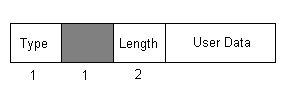Leadtools.Dicom Namespace > Classes > DicomAssociate Class > Methods > AddUserInformation Method (DicomAssociate) > AddUserInformation(byte,IntPtr,int) Method
←Select platform
In This Topic ▼
AddUserInformation(byte,IntPtr,int) Method
Summary
Appends a User-defined item to the DICOM Associate.
Syntax
C#
C++/CLI
public void AddUserInformation(byte type,IntPtr data,int dataLength)
public:void AddUserInformation(byte type,IntPtr data,int dataLength)
Parameters
type
Type of the User-defined item.
data
Pointer to a buffer that contains the data for the User-defined item.
dataLength
Length of the User-defined item.
Remarks
User-defined items may be included in the DICOM Associate to provide any other data the user finds necessary when establishing a DICOM Associate connection. The basic structure of the User-defined item is

where the Type, Length and User Data are all determined by the user. The values shown are the lengths, in bytes, of the elements of the User-defined item.
Example
C#
using Leadtools;using Leadtools.Dicom;void BuildVerifyAssociate(){//Make sure to initialize the DICOM engine, this needs to be done only once//In the whole applicationDicomEngine.Startup();using (DicomAssociate associate = new DicomAssociate(true)){//Role Selectassociate.AddPresentationContext(1, 0, DicomUidType.VerificationClass);associate.SetRoleSelect(1, true, DicomRoleSupport.Supported, DicomRoleSupport.Unsupported);Debug.Assert(associate.IsRoleSelect(1) == true);Debug.Assert(associate.GetUserRole(1) == DicomRoleSupport.Supported);Debug.Assert(associate.GetProviderRole(1) == DicomRoleSupport.Unsupported);//Extended Dataassociate.SetExtendedData(1, new byte[] { 55 });Debug.Assert(associate.GetExtendedDataLength(1) == 1);byte[] extendedData = associate.GetExtendedData(1);Debug.Assert(extendedData[0] == 55);// We can also call GetExtendedDataPtr//Asynchronous Operationsassociate.SetAsynchronousOperations(true, 5, 5);Debug.Assert(associate.IsAsynchronousOperations == true);Debug.Assert(associate.InvokedOperationsCount == 5);Debug.Assert(associate.PerformedOperationsCount == 5);//User Informationassociate.AddUserInformation(4, new byte[] { 88 });Debug.Assert(associate.UserInformationCount == 1);Debug.Assert(associate.GetUserInformationType(0) == 4);Debug.Assert(associate.GetUserInformationDataLength(0) == 1);Debug.Assert(associate.GetUserInformationDataPtr(0) != null);byte[] userInformationData = associate.GetUserInformationData(0);Debug.Assert(userInformationData[0] == 88);associate.SetUserInformation(0, 3, new byte[] { 56 });userInformationData = associate.GetUserInformationData(0);Debug.Assert(userInformationData[0] == 56);associate.DeleteUserInformation(0);}DicomEngine.Shutdown();}
Requirements
See Also
Reference
GetUserInformationDataLength Method
GetUserInformationDataPtr Method
Help Version 23.0.2024.8.20
Products | Support | Contact Us | Intellectual Property Notices © 1991-2025 Apryse Sofware Corp. All Rights Reserved.
Leadtools.Dicom Assembly
